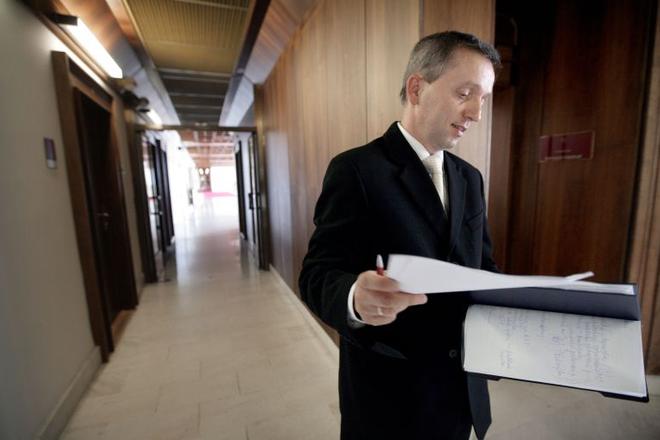THE CONSTITUTIONAL Court might be able to resolve the deadlock which was the result of a dispute between elected but never appointed general prosecutor Jozef Čentéš and Slovak President Ivan Gašparovič, in which both sides challenged all but one of the court’s 13 judges on grounds of alleged bias. The justices of the Constitutional Court, according to information obtained by the Sme daily, have adopted a new measure stipulating that if all the court’s judges are blocked due to objections of bias, the plenum of the Constitutional Court will pick a new senate. Yet, objections of bias filed against members of this new senate or objections that members of this senate would file against each other would not be considered by the court, according to Sme.
Meanwhile, in a Smer-orchestrated vote, parliament elected Jaromír Čižnár, a former law-school classmate of Prime Minister Robert Fico, on June 18 to become the country’s next prosecutor general. Čižnár is still waiting to be formally appointed by Gašparovič to the post. The opposition parties have said that they still consider Čentéš to be the lawfully elected candidate to the post.
Earlier this year, the Smer party passed a law on the operation of the country’s Constitutional Court via a fast-tracked proceeding to resolve the deadlock at the court, with a group of opposition deputies from the Christian Democratic Movement (KDH), Ordinary People and Independent Personalities (OĽaNO), Most-Híd and the Slovak Democratic and Christian Union (SDKÚ) challenging the legislation with the court and requesting a preliminary injunction to suspend its validity. The court complied with the request on June 5.
Čentéš on July 4 said that he respects the court’s decision, adding that it is better than the revision passed by parliament.
“This change to the schedule, unlike the suspended revision to the law, does not cancel earlier legal decisions of the Constitutional Court and in no way manipulates their effect,” said Čentéš, as quoted by Sme, adding that “he considers this a fundamental and objective difference”.
Čentéš assumes that based on the passed measure, his complaint will be handled by a senate comprised of Ivetta Macejková, Ľudmila Gajdošíková and Rudolf Tkáčik, who had already been assigned in March 2013.
“Objections of bias have been raised against members of this senate after its establishment, gradually by Mr President and myself,” Čentéš told Sme, adding that so far no decisions have been made on these objections and that he interprets the passed measure in a way that these objections will no longer be considered and that this senate will decide on all the other objections raised in the course of proceeding. The court, however, has not yet responded to Sme about whether Čentéš’ interpretation matches the court’s intentions.
Failed trial
The court has held several hearings to address the stalemate in the Čentéš case, but its last attempt on April 30 failed. Previously, the court tried to resolve the situation on April 24 when, at a closed session, several alternatives were discussed. Yet, Constitutional Court President Macejková did not accept the procedural proposals submitted by several judges to the court’s operation schedule, arguing that she could not do so because of the ongoing parliamentary session, in which the revision to the law on the court’s operation was being discussed, the SITA newswire reported.
Macejková said on April 30 that the result of the parliamentary discussion could influence the legislation regulating the operation of the court and thus also the possible work schedule, which, as an internal norm, must be in line with the law, SITA wrote.
Yet, one Constitutional Court judge, who refused to be named, told Sme that the situation is worse than the so-called ‘night of the long knives’ under the government of Vladimír Mečiar, referring to 1994, when Mečiar’ s Movement for a Democratic Slovakia (HZDS) seized power in all parliamentary committees and completely eliminated opposition parties from any influence in the committees. Sme quoted another judge as saying that if there had been a vote at the court, the situation could have been resolved.
The revision passed by the Smer-dominated parliament foresaw the implementation of the doctrine of necessity based on the so-called Bangalore principles of judicial conduct. It would have made it possible for judges who were previously excluded from deciding on a given matter to pass judgment if inactivity on the part of the court would lead to a denial of access to fair judicial treatment.
On this basis the Čentéš case was returned to the originally assigned senate composed of Justices Marianna Mochnáčová, Milan Ľalík and Peter Brňák, despite Brňák and Ľalík having both been excluded from ruling on the case based on Čentéš’ objections to them.
The objection war
The ‘objection war’ began in early January 2013, when Čentéš filed an objection to Gašparovič’s formal refusal to appoint him. This was to be considered by a panel composed of Justices Mochnáčová, Ľalík and Brňák. Čentéš immediately filed an objection against Brňák and Ľalík, which was accepted by a panel composed of Justices Lajos Mészáros, Sergej Kohut and Juraj Horváth. As a result, Ľalík and Brňák were replaced by Ján Luby and Ladislav Orosz. Gašparovič, however, submitted an objection to Luby and Orosz – and then to Mészáros, Kohut and Horváth, who were to hear his objection. The Constitutional Court then established a third panel to judge the objection against the second panel, composed of Justices Tkáčik, Ján Auxt and Ľubomír Dobrík. Čentéš submitted an objection against Auxt and Dobrík at the end of February, and this objection went to a panel consisting of Tkáčik, Gajdošíková and Macejková. The president then objected to Tkáčik and Gajdošíková. Čentéš subsequently submitted an objection to Macejková, leaving Mochnáčová as the only judge of the court not subject to an objection.
Ľalík and Brňák are the only judges to have been formally excluded so far.



 Jozef Čentéš (source: Sme)
Jozef Čentéš (source: Sme)